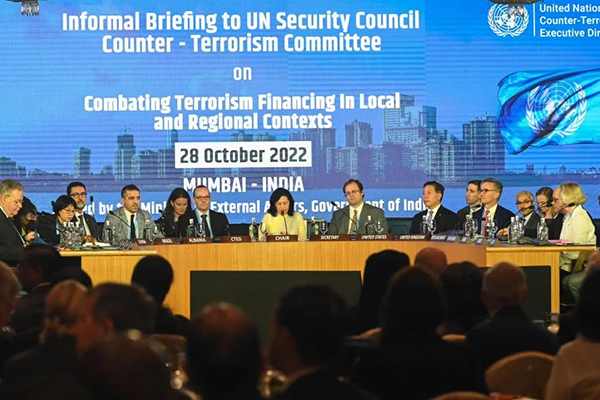
Indian intelligence officials, on 28 October, highlighted to the UN Counter-Terrorism Committee (CTC) that Pakistan’s inclusion in the Financial Action Task Force’s (FATF) “grey list” in 2018 had reduced attacks on “hard targets” in India and resulted in a 75% drop in terrorist bases on Pakistani soil.
The officials also exposed the role of Pakistan-based Lashkar-e-Taiba (LeT) in the 2008 Mumbai attacks before the CTC by playing an audio clip of top LeT operative Sajid Mir, in which he can be heard giving instructions to the attackers at Chabad House, a Jewish outreach centre where several Israeli citizens were killed.
The officials were briefing the members of the CTC during an informal session held at the Taj Mahal Palace Hotel, one of the main targets of the attacks carried out in November 2008 by a 10-member LeT team.
Mir was arrested by Pakistani authorities and convicted of terror financing earlier this year, just ahead of a plenary meeting of the FATF. This followed years of claims by Pakistan that Mir was dead, an issue highlighted by one of the two intelligence officials who made the briefings. The terror-financing watchdog removed Pakistan from its grey list last week after more than four years.
In his presentation before the CTC, senior Intelligence Bureau officer Safi Rizvi said without naming Pakistan: “The FATF grey-listing of a troublesome jurisdiction and UN designation of Jaish-e-Mohammad [in 2001] and Lashkar-e-Taiba [in 2005] as well as nine India focused terrorist individuals have been able to create an impact by bringing down attacks on hard targets in Kashmir, reduction of terror bases across the border, open raising of funds and open terror activity between 2018 and mid-2021.”
He specifically mentioned the FATF listing of Pakistan, saying it provided India “a window of relative peace”.
“The FATF, in the last 10 years, has been a very effective tool to implement those very [UN] designations. While there were intelligence-led counter-terrorism operations, Balakot airstrikes [after the Pulwama attack of 2019] and removal of Article 370 from Kashmir which pushed the terror infrastructure in a troublesome jurisdiction [Pakistan], a large portion of the credit goes to FATF grey listing and the UN designation,” Rizvi said.
“In the mid of 2018, there were 600 terror bases across the border, which went down by 75% during FATF listing. This, we think, is the most important success, on account of which the counter-terrorism community should take a deeper look at as to how effective designations are,” he added.
He, however, expressed concerns that Pakistan’s removal from the grey list has already led to an increase in terrorist activity in India. “The moment talks started that grey listing [of Pakistan] is about to end, things have started to slide back. There is an increase in terror bases by 50% and we are expecting more scalable attacks on hard targets, and much more trouble,” Rizvi said.
By hard targets, the officer meant well-defended government establishments and military camps in Kashmir.
Earlier, in a presentation on terrorism, Pankaj Thakur, joint secretary in the home ministry, said the Mumbai attackers were trained in Muzaffarabad in June-August 2008 and were given motivational speeches by LeT chief Hafiz Saeed and operations commander Zakiur Rehman Lakhvi.
The attackers were also trained at Muridke near Lahore for two months in matters such as hostage-taking. In September 2008, they received marine training, including GPS-based navigation. When they infiltrated Mumbai, the attackers remained in constant touch with their LeT handlers through VoIP phone. Among the key conspirators was an ISI official identified only as Major Iqbal, Thakur said.
Thakur played the audio of Sajid Mir, in which the LeT operative responsible for surveillance of the targets in Mumbai, can be heard giving instructions to terrorists who were at Chabad House. He said a proposal for sanctioning Mir at the UN Security Council was on hold.

















